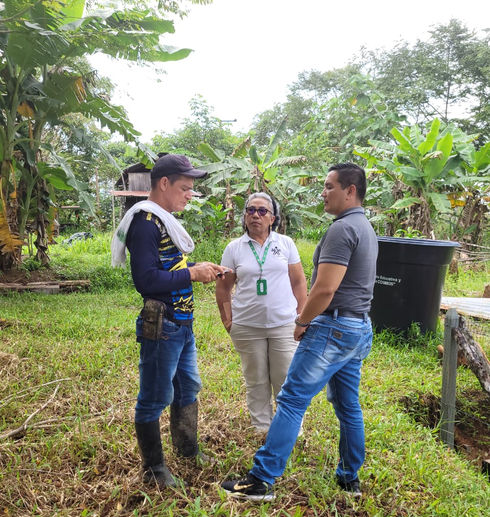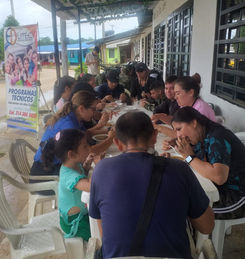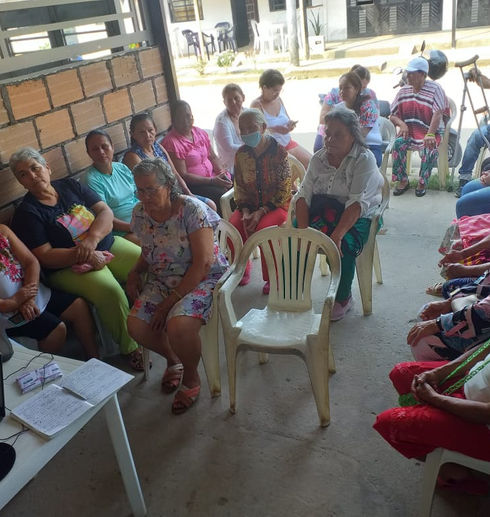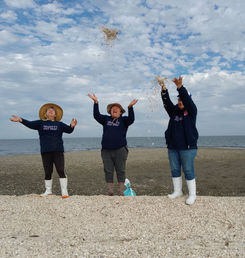Caquetá, Colombia
Peacebuilding through community gardening
Caquetá, a southern Colombian department nestled between the Andes mountains and the Amazon rainforest, has endured some of Latin America’s most persistent conflicts in recent decades. The Revolutionary Armed Forces of Colombia (FARC), a communist militia, fought for change from 1964 until 2016. Although a peace accord was signed between FARC and the government in 2016, lingering distress remains throughout the country, including in Caquetá. Tens of thousands have been displaced, drug cartels are attempting to seize control of the illicit coca market that FARC once dominated, social leaders live in fear of violence, and widespread economic inequality persists.
To address the deep-seated wounds from decades of conflict and tackle food security issues, the Corioli Institute led two community peace garden projects in the Vereda Bocana Agua Caliente (municipality of Morelia) and in La Gloria neighborhood of Florencia in Caquetá during 2023/2024. These initiatives, born from participatory engagement with regional stakeholders, involve conflict-affected individuals from all sides in building community gardens aimed at promoting environmental sustainability and peace. These collaborative efforts brings together victims of the conflict and former combatants, including ex-FARC members and former military personnel, fostering reconciliation and community resilience.
In Bocana Agua Caliente, through collaboration with SENA (Servicio Nacional de Aprendizaje, or National Training Service), we have finalized a contract between a small agrarian community and a local grocery store chain, Primo, in which the community will be cultivating lettuce, tomatoes, and cucumbers with a new hydroponics system provided by our grant. SENA will continue to partner with us in training the community members in the use of the new system and other critical sustainable practices. This project builds on empirical research conducted by the Institute on the Climate Change, Conflict, and Migration (CCM) Nexus.
In La Gloria, another peace garden project was implemented under the leadership of the female-led organization FUMUCASTIVIC (Fundación de Mujeres Campesinas Sin Tierra Víctimas del Conflicto Armado, or Foundation of Landless Peasant Women Victims of the Armed Conflict), which Corioli supported through an organizational strengthening approach. This ecological restoration project not only fostered collective action across social divisions, promoted sustainable agricultural practices, and enhanced food security in La Gloria, but also strengthened the institutional capacity of the local non-profit, establishing it as a notable part of Caquetá's civil society. FUMUCASTIVIC, composed of women who have been victims of armed conflict, including indigenous and Afro-Colombian members, plays a pivotal role in supporting reintegration and peacebuilding efforts in the region. By empowering these women and assisting them in realizing fostering community resilience, the project aimed to create lasting peace and sustainable development in an area historically affected by conflict.
Images taken by researchers from the Corioli Institute on the planning and construction of peace gardens in Bocana Agua Caliente (Morelia) and La Gloria (Florencia), as well as the
community engagement activities of FUMUCASTIVIC.
Corioli's work with SUCEDE "Sociedad en Acción de Sinaloa" in La Reforma, December 2023.
Corioli Institute Researchers working with Noreste Sustentable (NOS) in the community of
El Manglito, La Paz, Baja California Sur in 2022.
Corioli President and Chair Dr Erin McFee's March 2024 research and training trip to Garissa and Turkana counties in Kenya, where drought and environmental degradation
exacerbate already precarious conditions.
Impressions from the first "Out of War" conference dedicated to elaborating strategies for the reintegration of Ukrainian war veterans at LSE, October 2023.






























